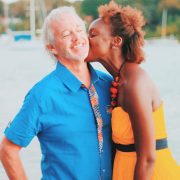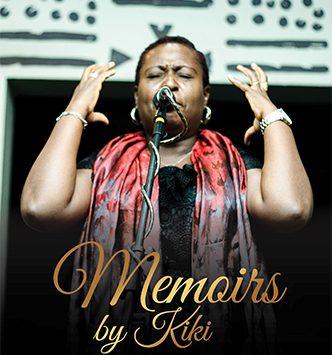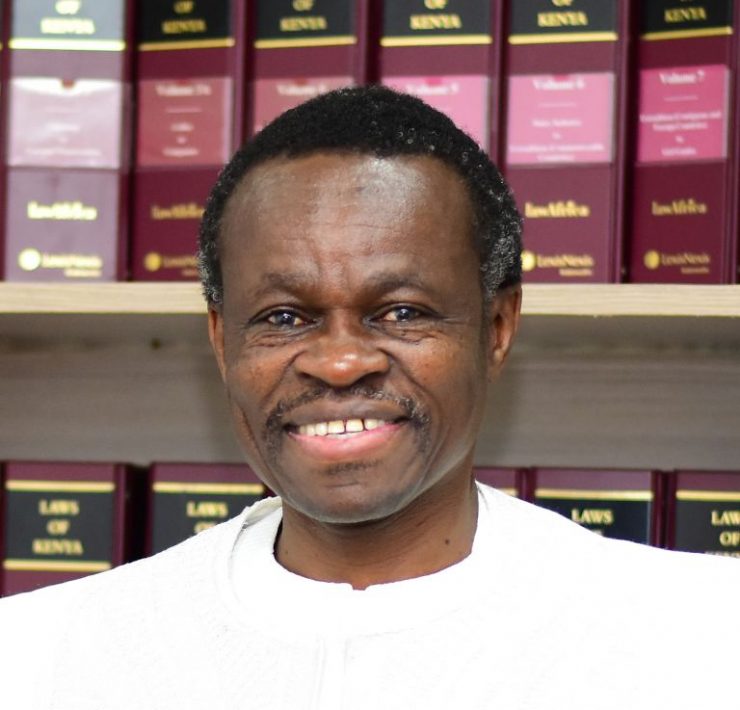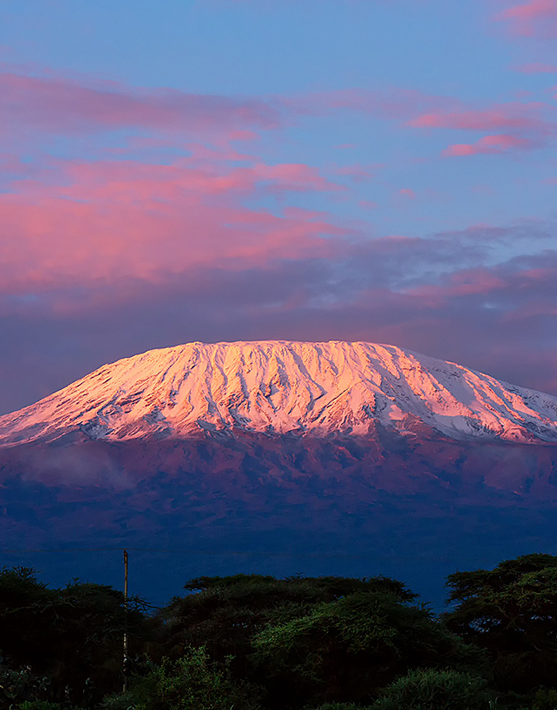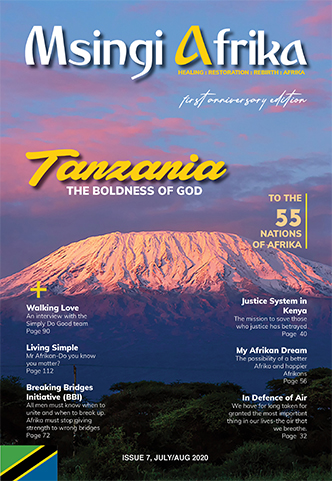FAITH STORIES
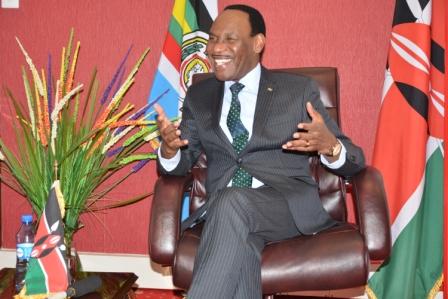
Chioma Phillips is the Editor of Msingi Afrika Magazine and…
DR EZEKIEL MUTUA: WALKING THE TALK, NO MATTER THE COST
We had the absolute honor of interviewing Dr. Ezekiel Mutua, Chief Executive Officer of the Kenya Film Classification Board who shared his faith story with us. One thing that stood out is how willing one must be to pay the price for taking the positions that God wants us to take. But the rewards, dear friends, the rewards are simply priceless.
Below is a brief excerpt of this energizing conversation, which you can also watch on Msingi Afrika TV here: https://www.youtube.com/embed/HCyg5lZxgwQ
Dr. Mutua, you attribute your life’s journey to the goodness and faithfulness of God. Kindly share with us why you say so.
My Christian faith and my firm standing in my faith in God is something that is intrinsically tied to everything that I do. I interpret life, I interpret my work, I interpret everything that I do in life, to my relationship with God. I am very unapologetic about it; it is something that I declare publicly in every office that I have held since I became an adult. And this is because, early in life, I had an encounter, on the 23rd of June 1984, where I gave my life to the Lord Jesus Christ. I am very conscious about the place and the time where that happened and the conviction that I felt. Part of it was informed by a lot of happenings in my childhood, where I saw the deliverance of God.
I was born and brought up in a place called Mwala in Ukambani, Machakos County by peasant farmers. In abject poverty. My parents had a troubled marriage and there were challenges that I started seeing, but I was fortunate because I had interactions with the people who would visit our home and my elder brothers who worked in Thika and other places and that started opening up my mind and stirring my imagination about the possibilities that are out there. When I went to school I did very well and I got affirmation from teachers who were celebrating me and speaking great things. Early in my secondary school life, I gave my life to the Lord and that transformed everything. I started now in the preaching life properly, I started reading the Bible, I started looking at the challenges we were facing and seeing the hope that is prophesied in the Bible or that is in the scriptures. I started relating my story with other characters in the scriptures that had such challenges, such difficult upbringings and so on and how they turned out to be. That changed my life completely to have a perspective of hope where there’s despair. A perspective of having faith that with God all things are possible and that if you work hard and believe in God and just put the necessary effort, that you can make it in life. Somehow, God lifted me from that environment of abject poverty and made me a shining example and I became a leader and even someone to look up to when I was very young.
By the time I went to University, my mind was made up; I was very clear how life is supposed to be lived. I knew, beyond reasonable doubt, that you don’t have to be an angel but there is God and there is the devil, there’s good and there is evil, there’s light and there’s darkness and it is a choice, how you want to live your life. Like Martin Luther King said, there are two ways to look at life: one, as if nothing is a miracle or, as if everything is a miracle and I chose the latter. That, for me, everything is a miracle, everything is God involved, whether it’s good or bad, nothing happens without God’s plan and so that has defined who I am and the decisions I make, how I live my life and I can say I have no regrets.
There’s a sense in which one’s life’s blueprint is actually determined by God and – if you’re prayerful – you can get a sense of where God is leading you.
Dr Ezekiel Mutua
That’s amazing and it’s so encouraging and inspiring. How did you make the choice of going into journalism?
There’s a sense in which one’s life’s blueprint is actually determined by God and – if you’re prayerful – you can get a sense of where God is leading you. When I was in Form 6 and I was making a choice for the course I wanted to take, I applied for Law. There’s something in me that hates injustice and fights injustice and I’m very courageous defending against it and I always have a way of getting my way through words. So, I thought I would be a perfect lawyer, but when the results came, I had not qualified for Law. My second choice was teaching, unfortunately, I was called for Bachelor of Arts in Kenyatta University, which was way below my points, and I was very clear that I would go there and change the course and do Education. That was never to be. My appeal was rejected, but the course that I took, Bachelor of Arts in Linguistics and Sociology, ended having some of the best lecturers of the time and some of those courses, including Critical Thinking, aligned again to my objective in life. To defend what I thought was right, stand my ground, argue it out, be able to interpret the realities of life from a philosophical grounding and make a decision that is based on what I perceive to be objective truth.
When I finished, I thought I would become an administrator, because a lot of people in Kenyatta University at the time, who were doing a Bachelor of Arts in Sociology and Linguistics ended up in the Provincial Administration, as it were then. But then, by God’s grace, I ended up bumping into a friend in the streets of Nairobi who told me that Nation was hiring and he gave me a note and told me to go to Nation Centre. I went and presented that note there. The rest is history. I ended up with a permanent and pensionable job at the biggest media house in East and Central Afrika. So I plunged into journalism, starting as a trainee reporter, I rose all the way to becoming a sub-editor. Journalism and law are like two sides of the same coin. You are there to push the cause of justice, to give voice to the voiceless, to defend them through your words and your articles. I ended up becoming Secretary-General of Kenya Union of Journalists on 21st of June 2001, having been overwhelmingly elected by journalists. I remember, in my inaugural speech, I gave a rebuttal to something that the President had said on Madaraka Day and he called me to go and meet him. I thought I was going to die. At that time things were bad, people feared the President. Only to go there and find he really liked me. Intelligence had given him my report and he spoke very well. My meeting with the President was covered widely in all TV stations and suddenly I rose to fame.
Later, I ended up leaving Nation Media Group and concentrating on my work as Secretary-General of KUJ and eventually, I became Director of Information and Public Communications, and finally, I was promoted to Information Secretary, which is the highest cadre of information officers in government and now I am CEO of the Kenya Film Classification Board. So my journey toward becoming a journalist was actually answering my childhood ambition of becoming a lawyer to defend people. I realize, even now as a CEO, that is exactly what I do. Of course, I have ended up pursuing elements of the law throughout my Master’s and PhD. I find myself, all the time, placed in positions where people’s lives are to a large extent dependent on decisions that I make and I always pray that I will do what Esther did, at the most critical time in the lives of people, be the answer to their prayers.
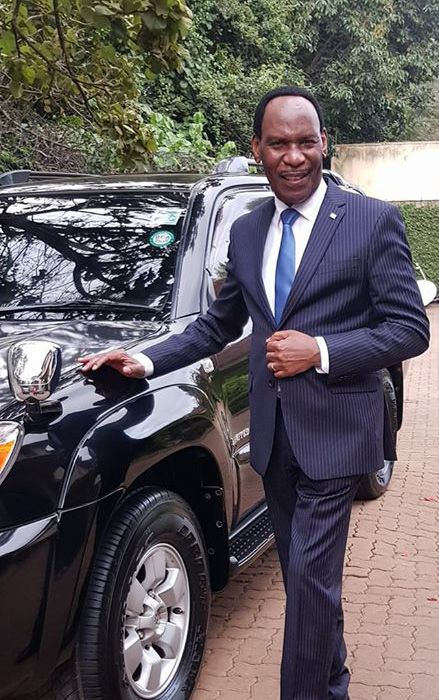
In your life, you have endured false accusations and even threats against your life for exposing corruption and fighting injustice. So, much like the characters in the Bible who you learnt from, you to have also had to learn to walk the path of persecution. Maybe you can tell us a little bit about that.
Yes, that’s very true and it’s not just in my working life. Like I told you, I came from a very challenging background as a child and I started fighting injustice right there. There’s a time when I was very young, I stood up to my dad and told him, “You are not going to touch my mom. Enough is enough if you don’t want to live with her, go or, tell us to go.” And that shocked him. Yet he was bigger and he was very violent and he calmly stopped and engaged me. Now they live happily together.
When I got into journalism, I wanted to use my pen and language and notebook to fight for justice, and I did a lot. I remember one time, on a Sunday evening, I was called by some church members who told me there’s a lady who had been operated at Kenyatta National Hospital, but she was thrown out of the hospital with her lungs gaping because she could not pay. I took a photographer and I went to Mwiki, Kasarani and I came back to the newsroom quite late, but the way I spoke to the news editor, it was given prominence. At that time, we didn’t have mobile phones, and so I wrote the story, went home late and so the following day I was not coming early. When I got to Nation Centre around 10, they were looking for me. The Minister for Health had come, they wanted me to go and show them where that woman was, we went and picked her with a convoy, took her back to Kenyatta Hospital and she stayed there, she was treated and when she was being discharged, I was called. Mwiki was very inconveniencing to access – but when I realized there was a woman like that who had been thrown out of the hospital and she was suffering and dying in the slums, I went there. This connects again, like I told you, to the childhood visions and dreams you have of what you want to become. How I got to KUJ, is that I started agitating for journalists’ rights with management. The rest of my colleagues said, “Oh this new guy is very courageous.” So I ended up being elected Chapel Father, and then Chairman and then Secretary-General.
When the Kibaki government came into power, to remove Moi, who had been in power for 24 years and who was being accused of all manner of things; corruption and so on and so forth, they came on the platform of fighting corruption. Within a very short time, the former British High Commissioner, Sir Edward Clay, who identified me on TV as a very vocal person, looked for me and he told me there was a lot of corruption in the government and he wanted me to use my platform and KUJ and journalists to expose it. I thought I was doing a good thing for my country and so we got into this unholy alliance. Some of the statements he used to make like, “Vomiting on donors’ shoes,” in my press conference as I was seated next to him… I didn’t know I was being identified as the enemy of the government. I wasn’t saying those things but I used to coordinate journalists to expose some of the things he used to say. He used to bring evidence and as a journalist, when you have the evidence then you go to town with that story with confidence because you are doing justice to your country. But that cost me a lot, I was seen as an enemy, some ministers thought I was bad for the country, that I needed to be silenced and so on.
My name was torn into pieces, they organized choreographed stuff that would look like I was also very corrupt and I had done a lot of evil things. I would be seated in my house watching TV and something comes on about me. I remember one time I saw a popular former rally driver addressing a press conference in Kilimani Police Station and mentioning my name and saying that he has recorded a statement that I wanted to kill him. I remember that time the late Mutula Kilonzo called me and he sent his son who is the current Senator for Makueni and he told him, “Go and represent that young man, I think these guys want to silence him,” and I overcame that. But there were a lot of instances, crazy things like those. And you’re just a simple journalist without anything.
That taught me that I needed to retreat and think about what I wanted to do in life because I had now come of age and I was getting exposure, I was traveling a lot, I was getting international connections and the government was monitoring me. I realized this thing they’re calling the Deep State, is real and it can really damage you. And that’s where I realized the power of prayer because I didn’t have a bodyguard, I was living in a very exposed place in Garden Estate; they could have come for me. Sometimes I would be followed by very strange cars, I would get death threats on my phone, and when I report that number, they call and say it is some telephone booth near Nairobi Cinema or something like that, and nobody would follow it up. At some point, God spoke to the CID Director, he was called, I think, Joseph Kamau and he used to hide me himself. He would help me to escape. He would tell me, “Hey, Chief, you need to beware we are coming, I’m sending officers to your office. I have to do it. Ezekiel, I know it’s painful but you have to do this, do this…” And he helped me manage that situation and I think to a great extent he also helped to explain to the government that I was innocent. Why I tell you it’s important to walk with God is I don’t know why I was not scared. I would even issue press statements and call press conferences and respond and call the bluff of those guys. I don’t know where the courage came from. I never cared. I never used to watch my back and I survived that period.
Now, the greatest miracle was when the government itself approached me from that background where we were fighting, to become the Director of Information and Public Communications. That happened in 2007 and when I changed, the media followed me and said I had been taken there so that I can gag the media before the elections of 2007 and I got very bad publicity. There’s a day, where I was item number one on five TV stations on stories that were cooked, to make them revoke the appointment. The headlines were the same in five TV stations. I would be watching Nation; somebody would call me and say, “Are you watching KTN?” “Are you watching Citizen?” And it was “The metamorphosis of Ezekiel Mutua”. It didn’t work. Somehow, God used Ambassador Muthaura, who was the head of Public Service, and he said, ‘This is the fellow we need, because, if he was defending his job where he was so vehemently, then he is the right person, he will defend the government.’ He just completely paralyzed that story, and the rest is history. I’m glad; God has been with me, I’ve seen the grace of God.
Wow, He really is your rear guard and many people have to understand. I listen to you talking and I remember these incidences as an observer, and to know the other side of the story! It’s terrifying and horrifying at the same time.
Very, and I was young and I had a young family but somehow God shielded me and I can tell you, I don’t think it was even because of my prayers and my righteousness. God has a way of hiding his people, even in their ignorance. I was so oblivious of the dangers and the powerful people I was facing. The Minister for Internal Security was a powerful towering figure. He would issue a statement and I would respond and say that “You cannot chase Moi from power on the basis of corruption, only for you to come and do these things. We are going to expose you.” And I had nobody, no relative, there was nobody I could go to and tell that I was in danger. No one. Absolutely none. But God protected me. I think I am a living example that you don’t have to have a godfather, you need to have God the Father, and if you know God and you live true to the scripture, God protects His people.
It’s very true. And you know, the Spirit of God hates injustice, He hates it. And so, in you, he found a vessel who is willing to fight, so he made sure that he had your back. But, why not simply just back down? Why did you persist?
I think like I’ve told you, from childhood I was called to do what I’m doing. When I look at my studies, when I look at my trajectory in life, I think God created me to do this. When I listen to Angela Chibalonza’s song “Uliniumba nikuabudu” (You created me to worship You), I think this is my cause and my objective in life, so it’s not even about me. So I can’t quit, because it’s not about me, I don’t know what drives me, I know it’s not me, it’s not my own righteousness, it’s not even my own knowledge. There are many traps that God speaks to me about and I jump because I hear a voice telling me, “Something is coming. If you confront it this way, it’s not going to be well.” And I have such strong intuition that makes me feel that this one is just preparing me for the next assignment, and I feel it so strongly, I get so passionate. The things that I do sometimes offend a lot of people but God tells me, “There are more who are celebrating you.”
I can tell you when I left Nation; I was in a very bad situation. I had just started a family, we were not stable, I didn’t have a Master’s degree; I had nothing. I had written a letter to the Aga Khan about what I thought was mismanagement at the Nation and I thought as Secretary-General of KUJ I needed to write about those things and inform the owner of the media house about some of the things that I thought were not right. And the MD told me to withdraw the letter or lose my job. And somehow, you know that courage that borders on foolishness, if you are to look at it from a human perspective? I refused and sure enough, when I walked out, I remembered I had left something on my desk and when I tried my card, it wouldn’t work. There are many incidences where I have had to forego a fortune, just to stick to what I believe. Not because I knew what God was going to do with me, but because I believed and felt very strongly in my heart that that was the right decision to take. Somehow the Spirit of God enabled me to make those decisions with courage, without regret. Once I left, the group CEO, saw something in the way I conducted myself afterwards that convinced him to ensure that I got what was due to me. He handled it himself. It would have been easier for me, if it was about money, to tell him “I can even withdraw the letter and come back to work.” But, I didn’t.
Eventually, when the government was looking for a credible person who has values and who can become the Director of Information and Public Communications, I was getting calls and being told the Cabinet is discussing you, the president wants you, everybody is saying you can manage this docket and we will be very happy if you don’t turn it down. So, you can imagine I didn’t have a Master’s degree and they had to advertise the job twice to fit my CV. And the rest is history. That was God because when I went for the interview, there were professors of journalism, and I was number one. Even though I had only one degree and there were people with PhDs, but when we sat, we went through the Public Service Commission, and I appeared before the panel, I wowed them.
In 2015, I thought I needed to move from just policy formulation to implementation, which is now what I’m doing by enforcing Cap. 222, to protect children from exposure to harmful content and to ensure stories that are told by the media and through film reflect our culture and our values, especially family values, and that we become a Godly nation. That’s my desire, to see the media projecting more objective stories, more clean content. To see the airwaves now dominated by stories that are edifying… that give hope. I saw how digital migration would open the spectrum, bring in social media and other players and I strategically applied when I saw this position. And just like the others, I was number one again at the interview and I was taken and I have been there now for five years this October, and I’ve done a good job of it. I think the last rating by SCAC, which is the body that rates state corporations, I was rated 99%, which is a rare feat. I can say for sure. God has been with me.
And I had nobody, no relative, there was nobody I could go to and tell that I was in danger. No one. Absolutely none. But God protected me. I think I am a living example that you don’t have to have a godfather, you need to have God the Father, and if you know God and you live true to the scripture, God protects His people.
Dr Ezekiel Mutua
The rewards for faithfulness are evident, it’s true. And we really thank God for you.
Not without pain though. Not without attacks, not without crisis. Every day there will be a crisis or another. I know a lot of brothers and sisters in government who face this and we share a lot. They may not be as outspoken but I know a lot of guys in government who uphold the truth. Not every Civil Servant is corrupt. Not everybody in government is just there to loot. I can tell you there are people who are committed to serve the public, who are not looking for their own self-promotion or aggrandizement, they work for the public and they are committed.
Standing for God has a lot of challenges, but it is the best you can do, standing for what is right. Sometimes when people think you are hated and you are facing challenges, God gives you a cool ambiance, where even in the furnace, you’re enjoying the presence of God and the 4th man makes you comfortable in the midst of crisis and dangers and trials. ‘The peace of God that surpasseth understanding’. Little wonder the scripture says, ‘Worry about nothing, but in prayer and supplications…’ and if that becomes your lifestyle, if you live a certain way, confessing the same things, living the same things, for a period of time, that becomes your character and your nature. So, godliness is a lifestyle, it’s not something you do, you drop, you do, you drop. The way I live as CEO of KFCB, is the way I lived when I was the Director of Information, is the way I lived when I was Secretary-General of KUJ; same courage, same miraculous and deliverance stories. And I can tell you for sure if God gives you the assignment, He will make provision for you to accomplish it.
We see you as a very serious gatekeeper and your mandate is very heavy. Why is it so important at this time, and especially in these days, for a country and for a continent to have a moral safeguard?
First of all, there is no country anywhere in the world that has ever progressed without a moral foundation. If you look at even the Asian Tigers, they first started by building their moral fabric. You protect the institution of the family, you define the relationships between citizens, you define governance and you define the way public service is going to be conducted and the values that give growth to a country. The values of hard work, honesty, patriotism, teamwork and so on and so forth. Those values are Godly values and they are articulated. And all those values are promoted majorly through the media.
Someone wrote about the seven mountains of influence, and one of the greatest mountains, the most influential, if you ask me, is the mountain of the media, because it is the gateway to the soul. What we watch, what we read, it impacts the perspectives that we form about life about good and evil, right and wrong and particularly for the impressionable minds, like children. Their sense of integrity and personal character is defined by their interaction in the environment they are growing in. And that environment is informed largely by the gadgets they are interacting with now because the world now is a global village. A child in Kenya is interacting with children in other parts of the world and through computers, through Play stations, through mobile. And some of these alien cultures like homosexuality, they are imparted so easily through content into our children and because they have not reached the age of being able to choose for themselves between good and evil, they don’t know what is good and what is evil. They are in the exploratory space and that becomes dangerous because even radicalization is conducted in impressionable minds by someone giving misleading information to children and misleading them to believe in a lie. So when we talk about protecting children from exposure to harmful content, it’s not religious dogma. If we want a better world, a safer world, a world where there’s more love in families, where there’s more tolerance and more compassion among human beings, then we’ve got to mind and be careful about the kind of content that we consume and our children consume.
The idea is, how do we protect what matters most? Because children are the link between this generation and the next one. Unless we protect that one, then what do we exist for? And the work of the government, anywhere in the world, is to do three things: protect lives, protect property, and protect the values of the society. I say protecting values is more critical because you cannot have a proper sense of protecting lives and protecting property if our values are wrong. I think in my view the most important goal of the government is actually to do what I’m doing.. My take is that content regulation is key to national development. This is how we shape values and perception and that perception influences behavior of our children for the long term. So when I say, “Let us regulate content, let us respect the law”, people think, “This guy is just being moralistic,” so they call me the moral cop. This is critical, this is key to national development, and until we get this one right, we can build schools, we can build hospitals, and we can do everything else in terms of building the infrastructure. But until we sort out the software issues of our values, I can tell you the hardware will never function and it will never help. We cannot have sustainable development when the software is malfunctioning.
What's Your Reaction?
Chioma Phillips is the Editor of Msingi Afrika Magazine and the host of Msingi Afrika Television. Her hope is to see the Truth shared, with all who will listen, for the transformation of the people and the continent of Afrika - and the world. She believes passionately in the critical role that Afrika and Afrikans have to play on earth right now and hopes to ignite the spark that will cause them to see and believe who they are, so that they can live out their Truest lives for the remainder of their days.








